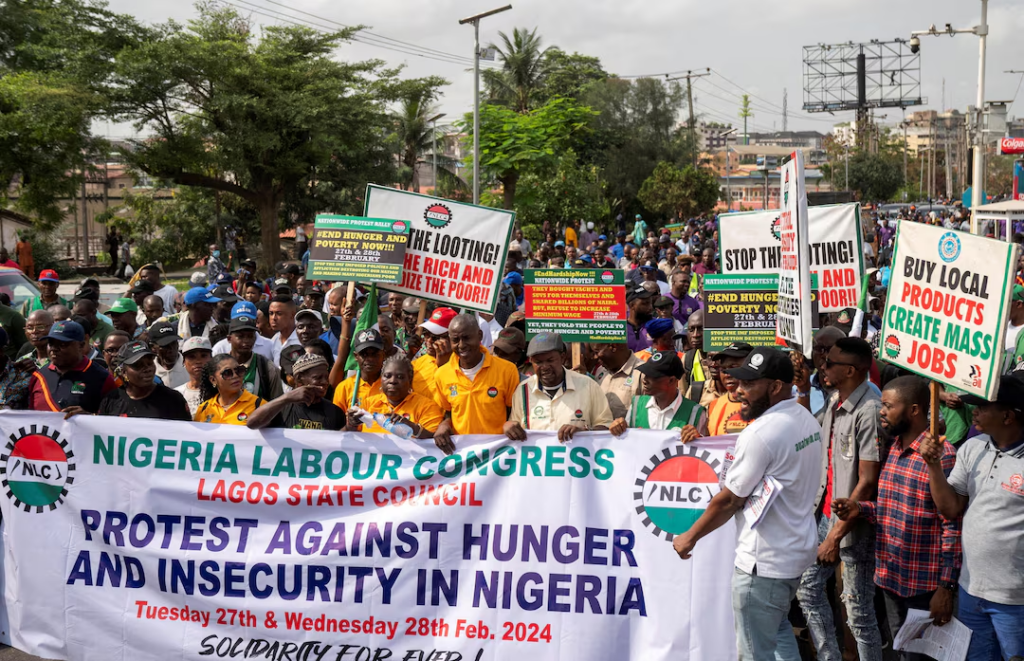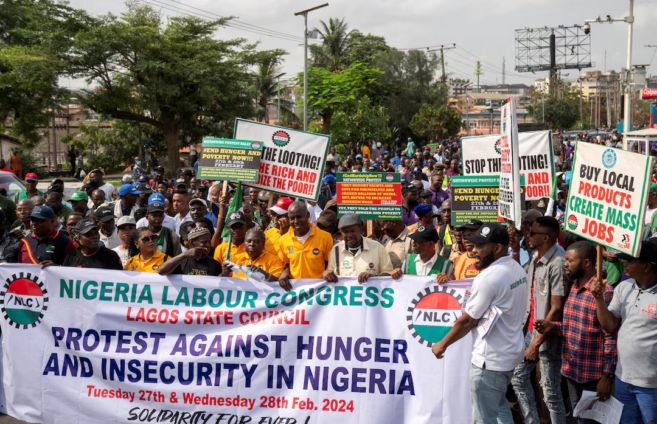Nigerian security forces deployed in major cities and the government said it was open to dialogue ahead of planned protests on Thursday against a cost of living crisis and poor governance that authorities fear could turn violent.
After taking office more than a year ago, President Bola Tinubu swiftly removed some fuel subsidies, devalued the naira currency and later hiked electricity tariffs, moves that have sent inflation soaring past 34%, eroding incomes.
Nigerians are also grappling with widespread insecurity, which has damaged the farming sector, while armed gangs kidnap residents and school children for ransom in the north.
Inspired by Kenyan protests, Nigerians are mobilising online to demand the reinstatement of petrol and electricity subsidies, free primary and secondary education and an end to insecurity, among other demands.
A senior government official, George Akume, said the protests could be infiltrated and become violent, without elaborating.
"We prefer dialogue, we are ready for dialogue," he told reporters, without saying whether the government had been in contact with the protest organisers.

"Nigeria is a work in progress and things will soon improve."
Tinubu's government has so far used a mix of threats and cajoling to discourage the protests.
In the capital Abuja, the commercial hub Lagos and the northern city of Kano, armed police deployed on major roads, set up security check points and searched cars.
Police occupied the main square in Abuja that protesters planned to use, while military vehicles parked nearby.
A court order confined Lagos protesters to two venues on the outskirts of the city.
Some Lagos residents said they were worried that protests could turn violent as happened during anti-police demonstrations, known as EndSars, in October 2020, when lives were lost and properties destroyed.
At one of Kano's largest malls, Sufi Mart, workers were busy reinforcing windows with shutters.
"I don't want it (the protest) to extend into the night so that it doesn't turn out to be another thing like EndSars," said Nneka Ochiachebe, who sells second-hand clothes at a Lagos market.
Latest Stories
-
Mpatasia galamsey pit responsible for 4 deaths in 4 months, undergoes reclamation efforts
1 hour -
‘Managers of SOEs must skillfully resist political interference’ – Jabesh Amissah-Arthur
1 hour -
Benjamin Asare signs contract extension with Hearts of Oak until 2027
1 hour -
Chaos in Asante Mampong as angry NDC supporters vandalise property, set items ablaze
2 hours -
The ECG Dilemma: We don’t have a fully efficient power value chain – Sulemana Ibrahim
2 hours -
ECG was never at the table in terms of revenue – Dubik Mahama
3 hours -
Kumasi Mayor to commence decongestion of the city on April 16
3 hours -
Per our tradition, we cannot mingle until there’s peace – Spokesperson for Bawku Naba
4 hours -
There was zero investment in ECG during Akufo-Addo’s first tenure – Dubik Mahama
4 hours -
Queen Titiaka partners Forestry Commission and others to bring climate-inspired hope to inmates of Nsawam Female Prisons
4 hours -
2030 World Cup: CONMEBOL proposes expanded 64-team tournament
4 hours -
EU to invest €300m to boost water provision in Greater Tamale
4 hours -
Playback: JoyNews held National Dialogue on ECG’s future
5 hours -
Teacher trainee allowance arrears fully paid – Students Loan Trust Fund
5 hours -
Cargill, ICI celebrate graduation of 60 youth from cocoa-growing communities
5 hours

